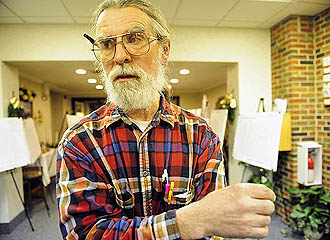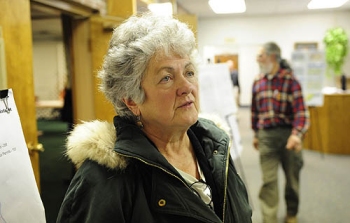Dunkard Creek Kill Frustrates Residents of Greene County
Pittsburgh Post-Gazette
5 December 2009
By Don Hopey
MOUNT MORRIS, Pa. -- Just a stone's throw from Dunkard Creek, the
frustration of local residents is more palpable than the toxic golden
algae that state and federal agencies say decimated fish, mussels and
aquatic life throughout 43 miles of that flow in September.
As the fatal fall algae bloom has faded, many along this creek that
meanders along the Pennsylvania-West Virginia border say they are
disappointed about the slow pace of investigations and angry that no
one has been held accountable.
"All we're asking for is an honest investigation," said Jim O'Connell,
a member of the local conservation group, Friends of Dunkard Creek, at
an informational meeting that attracted more than 200 people Thursday
evening in the Mount Morris Gospel Tabernacle Church.
"We are concerned that the emphasis on golden algae, which may be one
cause, is nonetheless a smokescreen for the real cause, high total
dissolved solids in the creek. We want Dunkard Creek restored by the
people who killed it."

John Yesenosky, East Dunkard Water Association
president, attends the
public meeting in Mount Morris, Greene County, to talk about the fish
kill in Dunkard Creek. John Heller/Post-Gazette
The Pennsylvania Fish and Boat Commission has asked the
Pennsylvania attorney general to conduct a criminal investigation into
the cause of the fish kill. Eric Shirk, a spokesman for the attorney
general, said the office is "looking into it," but declined yesterday
to provide details.

Tom Crist of the Pennsylvania Fish and Boat
Commission
John Heller/Post-Gazette
A U.S. Environmental Protection Agency interim report released
earlier
this week and the Pennsylvania Department of Environmental Protection
say discharges high in total dissolved solids came from mine drainage
treatment facilities along the creek and created the kind of brackish
water conditions in which the toxic algae thrives.
But none of those investigations has yet determined how the algae got
there or who is to blame for creating the stream conditions that
allowed it to bloom into a fatal force that caused big bass and muskies
to start going belly-up three months ago.
The West Virginia Department of Environmental Protection estimates that
between 15,000 and 22,000 fish -- many of them large game fish -- died
because of the toxins released by the algae. Also killed were large
salamanders or "mudpuppies," and 14 species of freshwater mussels, some
of them already ecologically threatened.
The Greene County Conservation District, which sponsored Thursday's
meeting along with the Upper Mon River Association, has estimated the
cost of restoring the creek at $30 million.

Betty Wiley, president of the Dunkard Creek
Watershed Association, comments on the the public meeting addressing
the fish kill in Dunkard Creek.
John Heller/Post-Gazette
Consol Energy, which discharges mine water high in TDS from its
Blacksville No. 2 mine and Loverage mine, has said other factors could
have produced the algae bloom that killed the fish.
"No one is 100 percent sure what caused the algae bloom. There's a lot
of other loading and factors on the creek," said Joe Cerenzia, a Consol
Energy spokesman.
Under an agreement with the West Virginia DEP, Consol must figure out a
way to reduce the TDS in its discharges by the end of 2013. Mr.
Cerenzia said the company hasn't decided how it will do that.
Angela McFadden, a member of the EPA's month-old regional resource
extraction task force, said the EPA is reviewing Consol's agreement
with West Virginia to determine if a fix can be done sooner. She noted
that Consol took just two years to build a new treatment facility at
one of its mines in West Virginia.
Another complication for the creek that is adding to the local
frustration is Consol's request to resume mine water discharges from
its Blacksville No. 2 mine that were stopped after the fish kill was
discovered. The company has said the mine has been filling up and could
soon become unsafe for mining.
"We're very concerned about the situation in the mine, and we'll have
to start pumping soon," Mr. Cerenzia said.
But Raymond Yackel, whose family owns a farm along the creek in
Pennsylvania, said Consol shouldn't be allowed to pollute the creek
again. He said Consol should be made to pump the mine water into
tankers and truck it to treatment plants.
"We live in the community -- I've been here for 31 years -- and we're
heartbroken about what happened to our creek," Mr. Yackel said. "I went
down to the creek in mid-September to see all the dead fish and I drove
away crying.
"Now I'm frustrated. No one is standing up to the people in
industries," he said. "It's simple economics. We're ruining the
environment because someone wants to take a shortcut."
Don Hopey can be reached at dhopey@post-gazette.com or 412-263-1983.


